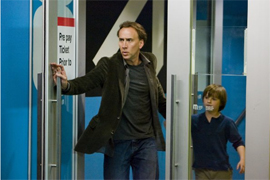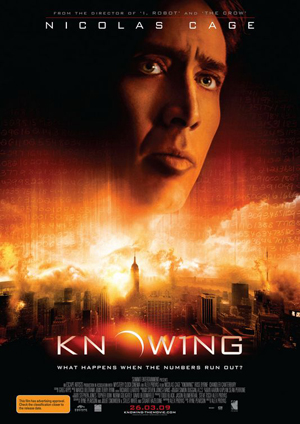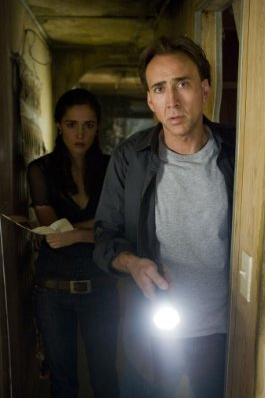|
Knowing
When
I first saw the poster for this film, I was convinced it
was yet another Roland Emmerich disaster containing global
disasters. Then I saw Nicolas Cage's name attached and I
immediately figured I'd be waiting for the DVD release.
Once I realized this was the new film by Alex Proyas (The
Crow, Dark City and I, Robot) though, I knew I had
to give it a theatrical shot which was only confirmed after
I saw the exhilarating trailer.
The film opens up in 1959 outside a Massachusetts elementary
school where a focused little girl, Lucinda Embry is seen
staring up at the sky as her teacher tries to gather all
the children back into class from recess. There is no indication
of who or what she is looking at, only that she is being
spoken to by indecipherable whispers.
Back
in class, her teacher (Danielle Carter) is collecting drawings
made by the children to be put into a time capsule that
will be opened by students fifty years later. The
assignment is to draw out what they imagine the future will
look like, but when Lucinda's paper is collected the teacher
is frustrated that hers is meticulously filled with numbers.
A disturbed Lucinda watches as her paper is taken away and
added to the rest of the pile to be sealed for students
yet to be born.
When the capsule is unearthed fifty years later, each present
day student is given an envelope that contains the various
drawings. It just so happens that Caleb (Chandler Canterbury),
a boy more interested in the Discovery Channel than the
Cartoon Network, opens the envelope that contains Lucinda's
dizzying numbers.
While
he finds this interesting, he finds it curious that a strange
blonde man in a long, dark coat watches him in the distance
and then disappears. Caleb lives with his father, MIT astrophysics
professor John Koestler (Nicolas Cage) since his mother
died which has brought them closer together. Yet it has
also distanced John from any passion for his profession
and finds him nursing away his sorrow with a bottle of booze
each night.
 |
When
John stumbles upon the numbers late one night, he notices
they are not exactly random. He discovers a cypher system
within the list that accurately depicts a series of dates,
fatalities and cooridinates representing major disasters
that have happened in the world in the last fifty years.
This sounds remarkable enough until John finds out that
three of the dates have yet to take place and are set in
the near future.
John feels he has stumbled across these numbers for a reason
yet he doesn't quite know what to do with this information.
He shares this chilling data with a colleague (Ben Mendolsohn)
who only becomes more worried for his already reclusive
friend. While stuck in traffic on his way to pick up Caleb
from school, he is alarmed by a set of familiar numbers
on his GPS device which correlate to the location of the
next disaster. This motivates him to get out of his vehicle
to find out why traffic has stopped.
Before
John can find out anything, we see a giant 747 falling out
of the rainy night toward the line of cars, plowing through
power lines above and then crashing in a field on the other
side of the highway. In a state of shock, John runs toward
the wreckage amid torn debris and enflamed screaming people
as he tries to help survivors. He is without any luck, the
numbers predicted the exact amount of people that would
die form this catastrophe.
Traumatized by this event, John becomes more determined
to intervene and prevent more destruction from happening.
Unfortunately, it's here that Nicolas Cage gets in the way
of the film. No surprise there. At almost every illogical
turn, Cage strays further away from a stunned professor
and closer to the gaped-mouth, flashlight-swinging action
hero viewers have come to know. There's no explanation why
he leaves Caleb alone in the car to encounter identical
strange men as he follows his numerical quest or how he
thinks he can possibly prevent the next disaster. It's not
the worst performance from Cage but if it makes you actually
recast the lead while watching the film, well, that's a
disaster right there.
Not even the addition of the usually delightful Rose Byrne
as Diana, Lucinda's daughter, could add a redeeming factor
to the film. She's just not given much to do except sob
and scream as she and her daughter Abbey (Lara Robinson,
who also plays Lucinda) team up with Cage and son. Cage's
character's poor parenting must be contagious because we
even find her leaving both children alone in a vehicle unattended.
There appears to be no room for realistic responses or plausibility
in this overwrought script which leaves the viewer as frustrated
as Diana when she comes to the conclusion that they can't
do much to prevent her mother's prophetic dates.
Of course, the writers must carry the responsibility as
well. Their weak subplots and deep plot holes make what
should be startling situations both laughable and predictable.
For example, the origin and purpose of these strange "whisper
men" (they are the source of the indecipherable whispers
after all) remain a mystery which is inexcusable considering
the impact they have throughout the film, especially the
ending. I knew it was a bad sign when a revealing plot element
at the end made me think, "Oh no. Not that".
What
a shame, since the story did start out like some of the
best X-Files episodes, examining philosophical
themes like whether or not universal events are random or
determined. But then it just seemed like substance suffered
to weak dialogue and spectacular effects.
As expected, Proyas and his crew deliver the right suspenseful
tone and some truly breathtaking visuals but it just doesn't
have the same impact as his previous films. Even one of
the most impressive large-scale subway derailments ever
filmed is minimized by characters reacting unnaturally to
crucial situations.
I'll
still follow the work of this talented director, but Oscar-winner
Nicolas Cage will have to be put back on notice as one of
the youngest actors to consistently phone it in. What started
out as a very intriguing sci-fi thriller leaves the audience
with that knowing feeling that they should have seen coming.
|








